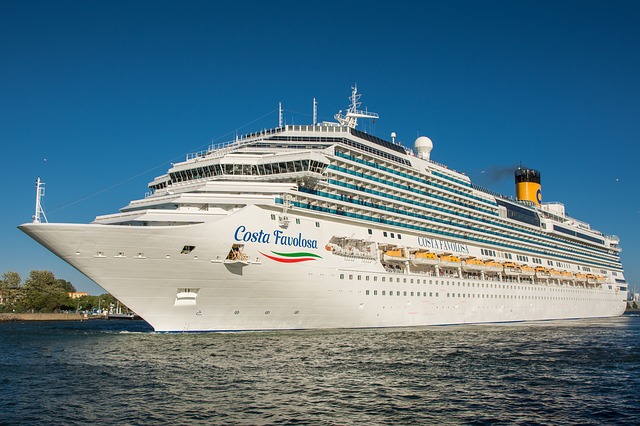MSC Cruises will make history Sunday when it becomes the first major cruise line to test all passengers for COVID-19 when the Geneva-based line’s flagship MSC Grandiosa sails on a seven-night cruise departing from Genoa. The Grandiosa is the first MSC ship to sail since the shutdown of the cruise industry in mid-March and will be sailing under health protocols developed by MSC that will include a COVID-19 swab test prior to embarkation for every passenger.
MSC Cruises CEO Gianni Onorato told travel media that prior to checking in, passengers would be swabbed and would proceed with check-in while the 90 minute rapid tests were being processed. Passengers with negative tests will be able to board. MSC will sail with the eyes of the entire global cruise industry firmly focused on the outcome of the voyage and whether the procedures will prevent any outbreak of COVID-19.
Other cruise lines have commenced sailings in Europe, with varying health protocols, but as yet none-have required pre-embarkation testing for passengers and results have been mixed.
>Great Discounts and Cruise Deals on Cruise Direct

COVID-19 testing to become gold standard for cruise industry
Despite early success, Royal Caribbean partner TUI will commence testing in September
Earlier this week, Royal Caribbean’s joint venture TUI Cruises of Germany said it was expanding its cruise restart with a third ship due to set sail in September when the Mein Schiff 6 will depart from the Greek island of Crete on a one-week voyage. The move comes after successful sailings by the Mein Schiff 1 and Mein Schiff 2 at 60 percent capacity without any reported cases of COVID-19 infection.
Several crew members however did test positive before boarding the Mein Schiff 1, with the company saying that its health protocols, in which crew are tested and then isolated for 14 days, were working. The company has also announced that from September, passengers will also be required to provide a negative corona test before being allowed to board.
In late July, 10 crew members of Carnival Corporation’s German subsidiary AIDA Cruises tested positive for COVID-19 after arriving at the German port of Rostock where they were due to board the AIDAblu and the AIDAmar. Despite the infections, AIDA Cruises had planned to continue with its restart, saying its protocols were working, however it was forced to cancel several August sailings after failing to receive authorization in time from its flag state, Italy, and will now resume sailing on September 6.
A major outbreak among crew and guests aboard Norwegian liner Hurtigruten expedition cruise ship MS Roald Amundsen led early August to the suspension of all expedition sailings by the company which was the first ocean cruise liner to resume sailing back in June.
COVID-19 testing to become gold standard for cruise industry
It is seeming increasingly likely that in the absence of vaccination, pre-embarkation and perhaps even on-board testing will become the gold standard for the cruise industry.
Royal Caribbean International CEO Michael Bayley suggested as much during a conference call with analysts last week, after parent company Royal Caribbean Group posted a $1.6 billion net loss for the second quarter 2020.
While Bayley offered no specifics as to how and when testing would take place, his statements led to speculation that pre-embarkation or onboard testing could become part of the Royal Caribbean COVID-19 protocols once the US Centers for Disease Control (CDC) lifts its no-sail order.
“Testing is part of the thinking, but we have not yet reached a point in our protocols where we’re ready to publish and release for discussion,” Bayley said.
“But it’s very likely that testing will occur. We’re also seeing in discussions with multiple destinations around the world, which is another component of the return to service, particularly as it relates to Caribbean that testing is very much at the front of how people are thinking about protocols for returning.”
Pre-embarkation screening for COVID-19 has been adopted in guidelines issued by the European Center for Disease Control (ECDC) and the European Maritime Safety Agency (EMSA), however, only crew are required to be tested for the novel coronavirus.
Bayley’s statements suggest similar double testing could be adopted by the cruise industry, especially if attempts at developing rapid point-of-care COVID-19 testing are successful.

COVID-19 Testing in just tens of seconds
There are several such options being developed and while the fastest kits around currently take some 90 minutes, Israel and Indian scientists are working together on a test that they say could provide results in “tens of seconds” without complicated chemical testing – a potential game changer for the cruise industry and the world economy.
Another company that has said it is looking to rapid testing as a solution is Virgin Voyages, the new cruise brand of British travel and media tycoon Richard Branson, which is due to launch operations after a COVID induced delay in October 2020 with the Scarlet Lady.
In a press release when unveiling its “Voyage Well” health protocols, Virgin said that one of the key pillars of the plan “rapid and effective COVID-19 testing for all sailors [Virgin-speak for passengers] and crew prior to embarking.”
Rapid testing to make a huge difference
UnCruise President and CEO Dan Blanchard also spoke about rapid testing after a passenger on board the 60-guest Wilderness Adventurer received a call informing him that he had tested positive for COVID-19, resulting in the ship having to turn back to Juneau, Alaska, all passengers and crew being quarantined, and all the company’s remaining Alaska cruises being cancelled, only for the supposedly positive guest to be cleared along with all the other passengers after a second test.
“We know that rapid testing is out there but it’s not typically available for companies of our size,” Blanchard later told the media. “Rapid testing, in my mind, would make a huge difference.. If we’d had a rapid tester at the Juneau airport and it had a four hour return on it, that would make the difference between boarding that guest and not boarding that guest.”
Costs are heavy, but another outbreak would be a death blow to cruise industry
One person who has said that the cruise industry absolutely must adopt COVID-19 testing as other screening measures and distancing protocols, as important as they may be, will simply fail to prevent outbreaks, is maritime attorney Jim Walker, who runs the maritime law blog Cruise Law News.
“Guests will never completely and accurately complete health questionnaires about COVID-19 in order [to] assist the cruise companies in excluding them from the cruise that they paid for and are prepared to take” says Walker. “Requiring vacationers to be honest about voluntarily disclosing their symptoms just related to gastrointestinal illnesses has not been successful over the years in the cruise lines’ efforts to reduce the spread of norovirus. And neither a questionnaire nor a temperature probe will lead to the disclosure of COVID-19 by travelers who are not exhibiting symptoms.”
Walker concludes: “The costs and logistics of testing may be significant and burdensome. But the cruise industry has lost literally many billions of dollars since the beginning of the pandemic. The first COVID-19 outbreak on a cruise ship …. may well be a death blow to the struggling cruise industry.”
The consensus seems to be growing that rapid COVID-19 testing is the way forward for the cruise industry.





